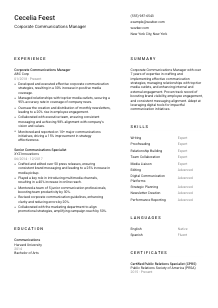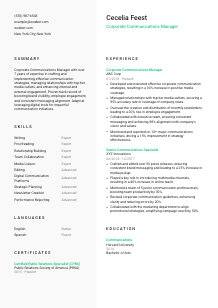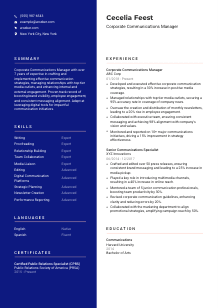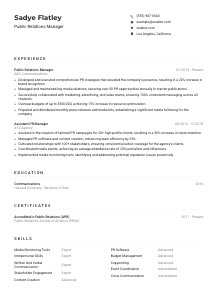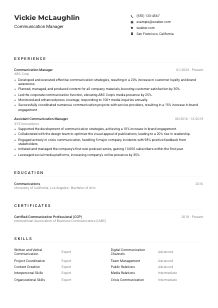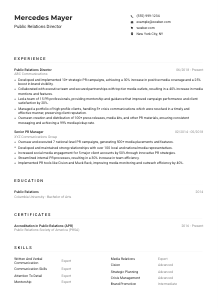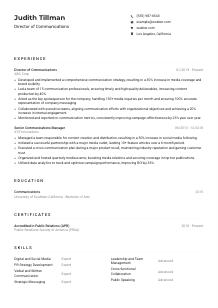Corporate Communications Manager Resume Example
Orchestrating messaging, but your resume feels like static? Dive into this Corporate Communications Manager resume example, tuned with Wozber free resume builder. Discover how to harmonize your PR prowess with job cues, striking the right chord with employers in your communications career crescendo!
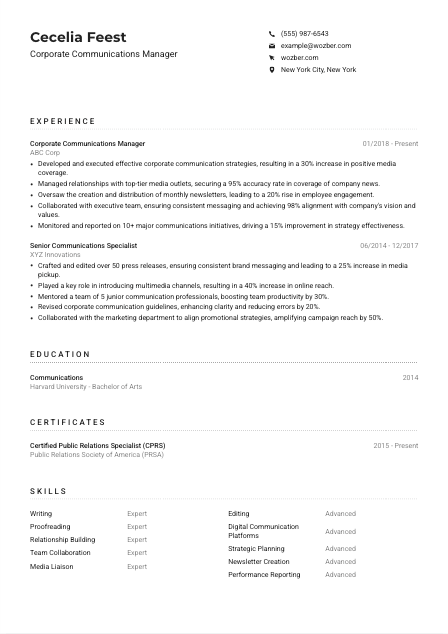
How to write a Corporate Communications Manager resume?
Embarking on the journey to capture the essence of a Corporate Communications Manager in your resume? Consider this your roadmap for merging strategy with storytelling, tailored especially for this dynamic role. With Wozber's free resume builder at your service, crafting an ATS-compliant resume that draws from the heart of the job description becomes an intuitive process.
Let's navigate through the intricacies of creating a resume that not only speaks to the Applicant Tracking Systems but also resonates deeply with hiring managers. So, are you ready to script your career triumph?
Personal Details
Your personal information is the opening act of your professional story. In the competitive realm of Corporate Communications Managers, it ensures that your resume doesn't just blend in but stands out. Follow these tailored steps to make sure your introduction sets the stage for success.
1. Your Name, Your Brand
Like a headline in a press release, your name should grab attention. Ensure it's prominently displayed using a clear, professional font. Remember, you're not just a name on a page; you're the main character in this story.
2. Direct Connection to the Role
"Corporate Communications Manager" isn't just a job title; it's a role you embody. Position this title prominently on your resume to forge an instant connection with the hiring manager. It's like aligning your personal brand with the desired role from the get-go.
3. Crystal-Clear Contact Info
In the fast-paced world of communications, being reachable is paramount. Present your phone number and a professional email clearly. Think of this as ensuring your channels of communication are always open and clear, mirroring the skills necessary for the job.
4. Location, Location, Location
Being in New York City isn't just a detail; it's a strategic advantage for this role. Highlighting your location meets a specific job requirement and places you on the map quite literally—no relocation necessary.
5. Online Presence
If you've got a LinkedIn profile or a professional website that showcases your portfolio, don't hesitate to include it. Make sure they're polished gems that reflect your personal brand and professional voice—consistent and compelling, just like the newsletters and press releases you craft.
Takeaway
The Personal Details section is your opening pitch. Treat it with the strategic precision of a well-crafted press release. It's there to make an immediate connection and set a professional tone. Aim for clarity, relevance, and a sprinkle of personality. With the stage perfectly set, you're ready to captivate your audience.





Experience
In the realm of Corporate Communications, experiences act as your portfolio—each role a campaign, each accomplishment a successful pitch. The following steps ensure your experiences aren't just listed but narrated to convey the impact you're destined to bring to your next role.
- Developed and executed effective corporate communication strategies, resulting in a 30% increase in positive media coverage.
- Managed relationships with top‑tier media outlets, securing a 95% accuracy rate in coverage of company news.
- Oversaw the creation and distribution of monthly newsletters, leading to a 20% rise in employee engagement.
- Collaborated with executive team, ensuring consistent messaging and achieving 98% alignment with company's vision and values.
- Monitored and reported on 10+ major communications initiatives, driving a 15% improvement in strategy effectiveness.
- Crafted and edited over 50 press releases, ensuring consistent brand messaging and leading to a 25% increase in media pickup.
- Played a key role in introducing multimedia channels, resulting in a 40% increase in online reach.
- Mentored a team of 5 junior communication professionals, boosting team productivity by 30%.
- Revised corporate communication guidelines, enhancing clarity and reducing errors by 20%.
- Collaborated with the marketing department to align promotional strategies, amplifying campaign reach by 50%.
1. Dissect the Job Requirements
Before diving in, dissect the job description. Look for verbs like 'develop', 'manage', 'oversee', and nouns like 'media outlets', 'newsletters'. These are your keywords and action items, the pillars around which you'll structure your tales of success.
2. Frame Your Professional Journey
Begin each experience with your title, company, and tenure to lay the groundwork. Then, let your achievements take the spotlight. Did you ‘develop and execute strategies'? Or perhaps you 'managed media relations'? Here, your career gets spotlight treatment. Use the job cues as your script.
3. Showcase Successes
Every bullet point is a story of success. Quantify your achievements—like 'resulting in a 30% increase in positive media coverage'. Numbers make your successes tangible. They translate your efforts into the universal language of improvement and progress.
4. Relevance is Key
Filter your experiences through the lens of the job description. Keep entries that align with being a Corporate Communications Manager at the forefront. Your stint as a graphic designer might be interesting, but does it align with crafting strategic communications? Focus on what matters.
5. Quality Over Quantity
Limit yourself to the most relevant roles and achievements. Think of your resume as prime advertising real estate. Every line should serve a purpose, drawing a direct line from past successes to future potential.
Takeaway
Your professional narrative is not just about where you've been; it's a preview of where you can take your next employer. Use your Experience section to build confidence in your ability to not just fit, but excel in the role. Let every word count towards illustrating your unmatched competency and strategic finesness in the field of Corporate Communications.
Education
In the arena of Corporate Communications, your education is the bedrock of your expertise. It's where theory meets practice, where ideas transform into impactful strategies. This section is more than a list; it's an endorsement of your professional qualifications.
1. Target the Core Requirement
The job calls for a 'Bachelor's degree in Communications, Public Relations, Journalism, or a related field'. This isn't just a detail; it's the cornerstone of your application. Ensure your degree aligns seamlessly with this requirement as a testament to your foundational knowledge.
2. Straight to the Point
Structure this section without clutter. List your degree, the field of study, and your alma mater, followed by your year of graduation. It's like drafting a press release—direct, straightforward, but informative.
3. The Perfect Match
Ensure the field of study listed matches the job specification to a T. If you majored in Communications, highlight it. This direct correlation reinforces your candidacy as precisely tailored for the role.
4. Relevant Extras
If there are courses or seminars that amplify your suitability for the role—be it in crisis management or digital media strategies—mention them. But be selective; only include what elevates your application.
5. Progressive Learning
For a field as dynamic as Corporate Communications, ongoing education and adaptability are key. If you've taken additional courses or certifications post-graduation that enhance your expertise, they're worth a mention here.
Takeaway
Your education section is a clear indicator of your preparedness for the role. It's the silent yet potent testament to your ability to build on a solid foundation with continuous learning and evolution. Highlight your educational journey with pride, showcasing your unwavering commitment to excellence in the field of Corporate Communications.
Certificates
In the world of Corporate Communications, certificates are your badges of honor. They showcase specialized skills, ongoing learning, and a commitment to staying ahead of the curve. Navigating through this section with a strategic lens is key to highlighting your unique qualifications.
1. Sync with Job Requirements
While the job description may not explicitly demand certifications, your decision to include them should hinge on relevancy. For a Corporate Communications Manager, a certificate like the 'Certified Public Relations Specialist (CPRS)' can underline specialized knowledge and commitment.
2. Quality, Not Quantity
Limit your list to certificates that echo the job's demands and elevate your profile. It's about showing you're not just keeping pace but actively advancing in your field.
3. Dates Matter
Especially in a rapidly evolving field, the dates of your certifications demonstrate your current expertise and dedication to staying updated. It's proof that your skills are fresh and aligned with the latest industry standards.
4. Ongoing Education
The communications landscape is always shifting. Mention any recent or ongoing certification programs to showcase your initiative in keeping your expertise sharp and relevant. It speaks volumes about your proactive approach to professional development.
Takeaway
Your certificates are more than just accolades; they're your commitment to excellence and professional growth in Corporate Communications. Curate this section to reflect your dedication to being at the forefront of the industry, ever-ready to adapt and excel.
Skills
Your skills section is where your professional prowess comes to life. For a Corporate Communications Manager, it's crucial to balance hard skills like 'Writing' and 'Digital Communication Platforms' with soft skills such as 'Team Collaboration'. Crafting this section with precision emphasizes your multifaceted expertise.
1. Mine the Job Description
Start with the job post itself—it's a treasure trove of required skills. Look for both the explicit demands ('Strong writing, editing, and proofreading skills') and the implicit ('Excellent interpersonal and relationship-building abilities'). These are your keywords, the core competencies you need to highlight.
2. Prioritize Alignment
Curate your skills list to mirror the job's demands. Featuring skills directly related to the job description not only optimizes your resume for ATS but signals to hiring managers that your toolkit is tailor-made for the role.
3. Balance and Brevity
While tempting to list every skill under the sun, focus on those that make you a standout Corporate Communications Manager. Think like an editor—trim the excess to leave only the most compelling content.
Takeaway
Consider your skills section as your professional narrative's plot points—each one contributing to the story of why you're the perfect fit for the role. By finely tuning this section to the job at hand, you present a compelling case of your readiness to step into the role with confidence and expertise.
Languages
In a globalized world, the ability to communicate across borders can set you apart. For a Corporate Communications Manager, proficiency in languages beyond English, such as Spanish, signifies an ability to navigate diverse audiences and widen the reach of your messaging.
1. Job Requirements
The job specifies 'Must have good English proficiency'. This is your baseline. But take a moment to consider the broader audience your work will reach. Could Spanish or other languages enrich your communication strategies?
2. Prioritize Accordingly
List English first, as it's the foundational requirement. But don't hesitate to include other languages—you never know when this additional expertise might align perfectly with the company's future projects or global markets.
3. Showcase Diversity
Each language you speak is a testament to your ability to engage with diverse cultures and perspectives. It's a skill that extends beyond communication—it's about empathy, understanding, and connection.
4. Proficiency Matters
Be honest about your language levels. From 'Native' to 'Fluent' or 'Basic', each term paints a clear picture of your ability to contribute to the company's global messaging.
5. The Role's Scope
Consider the broader impact of your linguistic skills. For roles with an emphasis on multicultural communication or global reach, your multi-language proficiency becomes a distinct advantage.
Takeaway
Embrace your linguistic abilities as part of your unique brand as a Corporate Communications Manager. They enhance not just your resume but your professional identity, lending depth to your role as a communicator and storyteller in a global stage.
Summary
Your resume summary isn't just an introduction—it's your elevator pitch, the compelling teaser before the main feature. For a Corporate Communications Manager aiming to stand out, it's about weaving your core competencies and achievements into a clear, concise narrative.
1. Essence of the Role
Begin by absorbing the essence of what makes a stellar Corporate Communications Manager. Reflect this in your summary—a savvy professional capable of 'crafting and implementing effective communication strategies'.
2. A Strong Introduction
Start with a sentence that positions you as the expert you are: "Corporate Communications Manager with over 7 years of expertise...". This quickly establishes your identity and experience level.
3. Highlight Matching Skills and Achievements
Dive into specifics next. Mention how you 'managed relationships with top-tier media outlets' or 'enhanced internal and external engagement'. Each phrase ties back to the job description, showing you're not only a match but the solution to their needs.
4. Keep It Snappy
Aim for a summary that's punchy and impactful. At 3-5 lines, it should encapsulate your expertise, drive, and the unique value you bring to the table. Think of it as the headline of your professional story—one that grabs attention and intrigues enough to keep reading.
Takeaway
Your resume summary is the opening paragraph of your professional narrative. Crafted with intention, it not only introduces you but also positions you as the exemplary candidate for the role. Let it be a mirror to your ambition, competence, and the unique voice you'll bring to the Corporate Communications Manager position.
Your Blueprint for Success
Collectively, these insights pave the way toward crafting a resume that speaks volumes. It's about precision, alignment, and storytelling—preparing you to step into the role of Corporate Communications Manager with confidence. Wozber's free resume builder, complete with ATS-friendly resume templates and an ATS resume scanner, is the toolkit you need to deliver a resume that resonates. Let your resume be the bridge to your next career milestone.
Here's to crafting a document that's not just ATS-compliant but undeniably you. Let the world hear your story, one success at a time.

- Bachelor's degree in Communications, Public Relations, Journalism, or a related field.
- Minimum of 5 years of experience in corporate communications, public relations, or a related field.
- Strong writing, editing, and proofreading skills with the ability to craft clear, concise, and consistent messaging.
- Proficient in the use of communication tools and platforms, including multimedia and digital channels.
- Excellent interpersonal and relationship-building abilities, with a strong teamwork mindset.
- Must have good English proficiency.
- Must be located in New York City, New York.
- Develop and implement effective corporate communication strategies, both internally and externally.
- Manage relationships with media outlets, ensuring accurate and timely coverage of company news.
- Oversee the creation and distribution of newsletters, press releases, company announcements, and other relevant materials.
- Collaborate with cross-functional teams to ensure consistent messaging and alignment with the company's vision and values.
- Monitor and report on the performance of communications initiatives, making data-driven recommendations for continual improvement.





